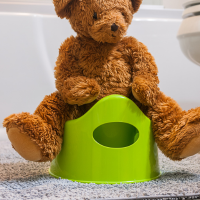Daytime Wetting
Most children are dry in the day by the time they are three years old and at night by the time they are five. Children should be encouraged to start potty training from 18 months of age
 We recommend the 3-step potty training approach
We recommend the 3-step potty training approach
It is very helpful to do a home bladder assessment for your GP / continence team
Start a bladder diary to support with the conversation.
My child is wet after being dry
If your child becomes wet after being dry or is struggling to become dry despite following advice and they are aged 4 and over, we recommend the following;
- Rule out an infection with your GP if sudden onset of wetting with pain
- Ensure child is not constipated
- Ensure child is drinking 6 – 8 (1.5l) water-based drinks a day (link to healthy drinking recommendations)
- Avoid bladder irritants as this can cause wetting i.e. fizzy pop, caffeine and blackcurrant squash
- Ensure child is having a wee regularly every 90 minutes to 2 hours
- Referral to a continence service may be appropriate if these steps don’t help
![]() Bladder and Bowel UK say that much can be done to support children experiencing bladder issues, and these can often be managed, improved and cured.
Bladder and Bowel UK say that much can be done to support children experiencing bladder issues, and these can often be managed, improved and cured.
I'm worried about my child starting school with continence problems
If you are worried about your child starting school with continence problems, please ask to see the school educational needs coordinator to discuss your concerns.
This may support with the conversation
 Children with Neurodiversity
Children with Neurodiversity
Children with Neurodiversity (Autism/ADHD) can experience extra difficulties gaining continence and this is often due to sensory processing issues.
Toileting - Guide for Parents and Carers




